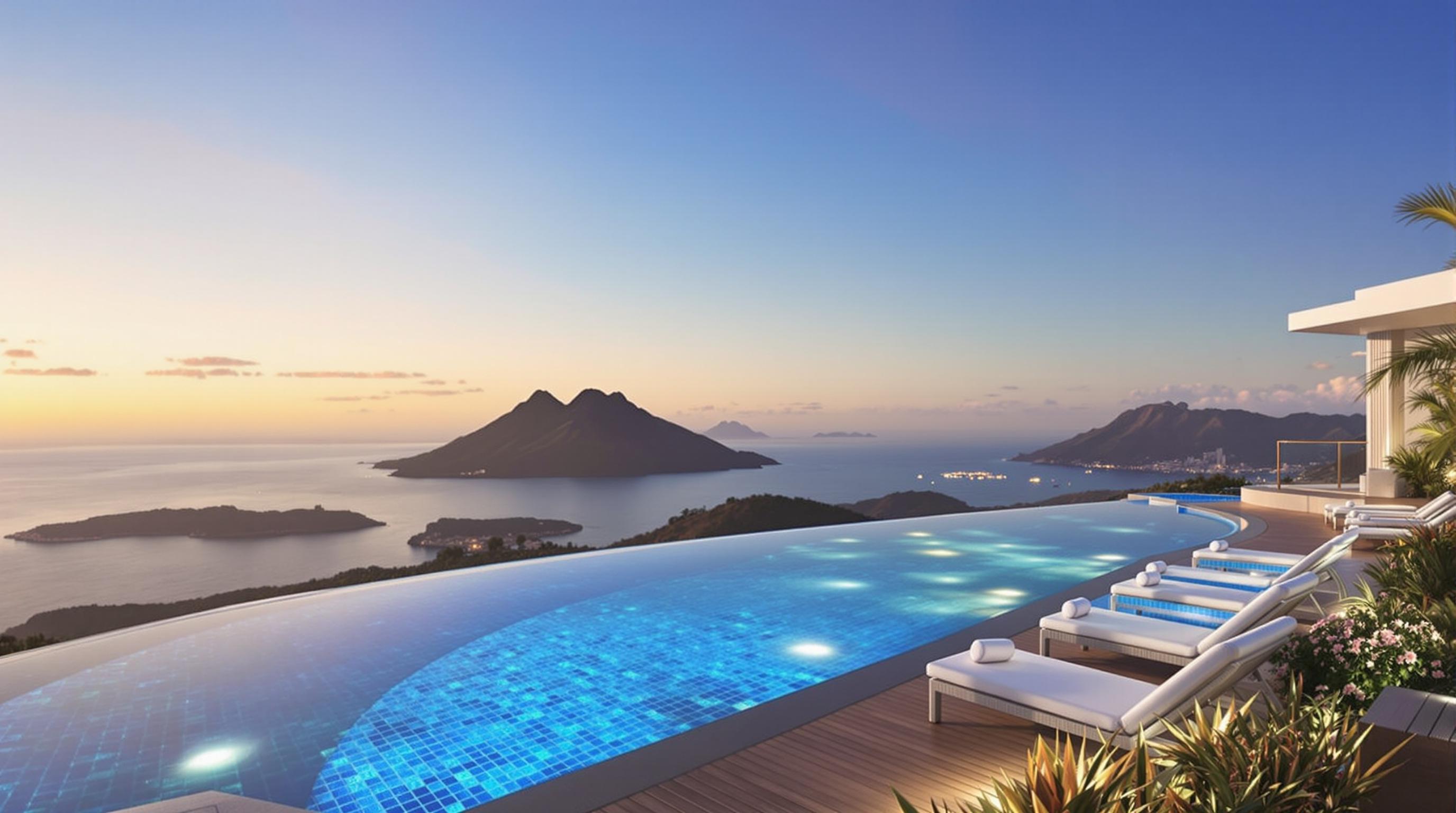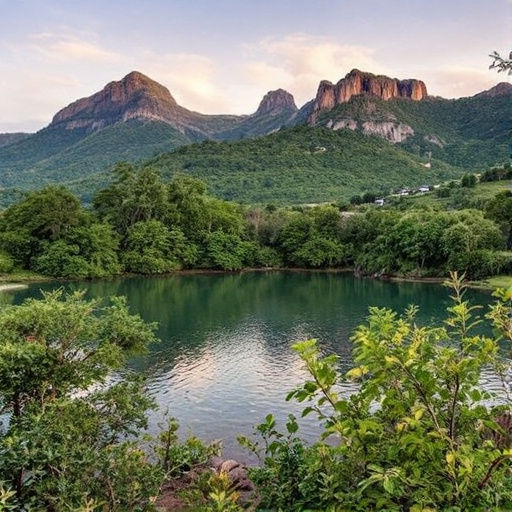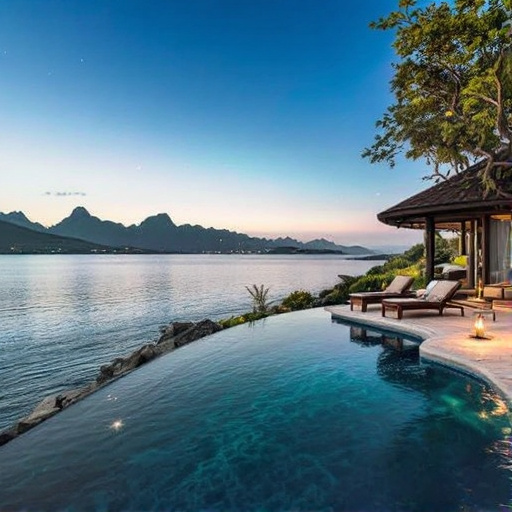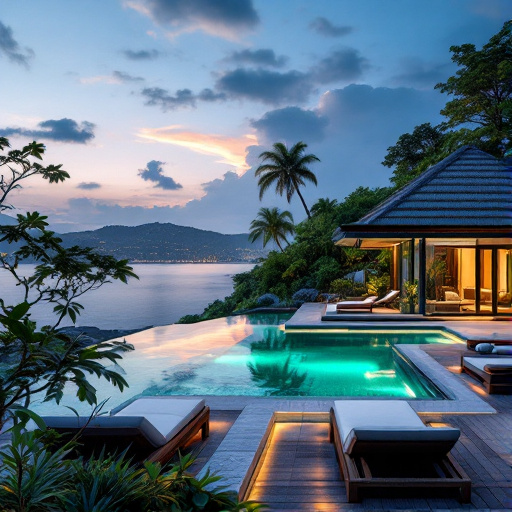Featured Articles
- 12 Insider Tips to Navigating Exclusive Luxury Resort Experiences Beyond the Usual Glamour
- "Eco-Luxury: How Sustainable Practices are Redefining the Future of High-End Resorts"
- Glimpses of Extravagance: Where Eco-Tourism Meets Luxury Resorts in the Heart of Nature's Untamed Beauty
- "Secret Sanctuaries: Unveiling the Hidden World of Sustainable Luxury Resorts in Remote Locations"
- The Rise of Eco-Luxury: How Sustainable Practices Are Redefining Five-Star Experiences
When Extravagance Meets Sustainability: The Rise of Eco-Conscious Luxury Resorts
When Extravagance Meets Sustainability: The Rise of Eco-Conscious Luxury Resorts
In a world where the luxurious often clashes with the ethical, eco-conscious luxury resorts are emerging as a harmonious blend of both extravagance and sustainability. These hospitality marvels cater to high-end travelers who value both opulence and environmental responsibility, creating a new standard for what it means to indulge while doing good.
The Evolution of Luxury Travel
Once upon a time, luxury was all about opulence: flashy chandeliers, marble floors, and gourmet dining. But as awareness of climate change and environmental degradation has grown, so too has the definition of luxury. A report by the World Tourism Organization shows that 70% of travelers are now looking for eco-friendly options in their travel choices. This shift is compelling stakeholders in the tourism industry to innovate in ways that not only please the affluent but also safeguard our planet.
Numbers That Speak
According to a study by GlobalData, sustainable tourism is expected to grow by 10% annually for the next five years. This is a testament to the fact that consumers are increasingly inclined to choose resorts that showcase their efforts in sustainability as a badge of honor rather than a marketing gimmick.
Making It Rain Sustainable
What does “sustainable luxury” even mean? Well, imagine living in a lavish villa made entirely from recycled materials, with solar panels silently working on the roof, and organic meals being prepared right from the resort's garden. Resorts like Six Senses have set the bar high by not only emphasizing sustainability but also offering top-tier service without compromising comfort. It’s a place where you can enjoy your poolside cocktail knowing that your stay supports local farmers and conserves natural resources to preserve the beauty around you.
Real-Life Examples
There’s the famous Four Seasons Resort Maui, which has integrated solar heating and a robust recycling program into their operations. Then there’s the Konfident Wellness Retreat in Thailand, which allows visitors to engage in mindfulness practices that blend perfectly with their eco-conscious initiatives. These examples serve as tangible proof that luxury doesn’t have to come at the cost of our planet's health.
Creating Awareness Through Eco-Concious Luxury
Another important aspect to highlight is that luxury resorts often engage with their communities, fostering awareness and encouraging conservation efforts. For instance, Banyan Tree Hotels & Resorts has gone all out with its "Green Imperatives" program, which supports various local environmental protection initiatives, from coral restoration projects to wildlife conservation. Imagine sipping your overpriced cocktail while watching a beach cleanup unfold – that’s the new narrative of luxury travel!
The Experience Economy
As we shift from a consumption-focused economy to an experience-driven one, travelers are keen to indulge in experiences that resonate with their values. While a Michelin-starred dinner may impress, a sustainability-focused culinary experience, where diners learn about local sourcing and ancient recipes, captivates the soul. This notion of transforming experiences into narratives is what upscale resorts excel in today.
Watching the Bottom Line
But let’s be real: traveling to a luxury resort is still a splurge. A night at the Soneva Fushi in the Maldives can set you back a couple of thousand dollars. However, consumers are increasingly willing to pay a premium for the reassurance that their money supports sustainable practices. In fact, a survey by McKinsey & Company found that 61% of travelers expressed willingness to pay extra for sustainable options in their travel plans.
A Seamless Blend of Luxury and Learning
Taking it one step further, sustainable luxury resorts are also enabling travelers to engage in educational outings. Imagine taking a guided nature walk with a local expert who teaches about regional flora and fauna, all while nestled in a plush resort setting that doesn't compromise your comfort. Travelers can indulge their thirst for knowledge while enjoying a pampered escape, merging pleasure with purpose.
Trends to Watch
One emerging trend is the incorporation of technology to aid in sustainability efforts. Many resorts are now employing advanced water conservation technologies, energy-efficient appliances, and smart waste management systems to create a minimal ecological footprint. According to the International Journal of Tourism Research, resorts that utilize such tech not only reduce their carbon emissions significantly but also lower operational costs in the long run.
The Next Generation of Eco-Conscious Travelers
Today’s younger generations, led by Millennials and Gen Z, are changing the landscape of luxury travel. They’re environmentally savvy and demand transparency from brands. According to a 2022 study by the Nielsen Global Sustainability Report, 73% of Millennials are willing to spend more on a product if it comes from a sustainable brand. This allows resorts to flex their eco-friendly ethos as not merely a marketing tactic but as a compelling philosophy that resonates with their clientele.
Mindful Merchants: Turning Waste into Treasure
In addition to eco-friendly building practices, many luxury resorts are prioritizing zero-waste policies. Instead of viewing waste as the end of the line, they’re adopting principles akin to the circular economy. For example, the Emerald Palace Kempinski in Dubai has created a waste-free kitchen, where scraps are composted and used in the resort’s gardens or transformed into unique dining experiences, such as tapenade made from leftover olives. This attention to detail caters to the conscious consumer's taste for authenticity and sustainability.
Convergence of Wellness and Sustainability
Wellness travel is on the rise, and many luxury resorts are seamlessly integrating health-focused retreats with eco-initiatives. At the Ananda in the Himalayas, for instance, guests can engage in yoga classes and Ayurvedic healing while staying in solar-powered villas surrounded by natural forests. Mindful capri pants and kale smoothies have never looked and felt so luxurious!
Impacting Local Economies
Contrary to the stereotype that luxury resorts drain local economies, many eco-conscious resorts are lifting communities. They hire local staff, support indigenous artisans, and provide a marketplace for local produce. This not only enriches the guest experience with authentic local flavors but also endorses sustainable tourism in the region. The Fairmont Hotels chain exemplifies success in supporting local economies while reinforcing its commitment to sustainability.
The Ripple Effect
As eco-luxury resorts flourish, they also inspire surrounding businesses to adopt sustainable practices. Restaurants, tour operators, and even local vendors begin to see the benefits of going green, creating a ripple effect that positively impacts the entire industry. This interconnected web of sustainable choices ultimately enhances the quality of life for all involved, allowing both travelers and hosts to thrive.
What You Can Do
As travelers, it’s essential to be conscious consumers. Opting for eco-luxury resorts and supporting entrprenuers that prioritize planet-friendly practices can drive demand for sustainability in the hospitality sector. So the next time you're booking a getaway, think about not just where you want to escape to, but also how that choice impacts the world around you.
A Mindful Future Awaits
We stand on the brink of a new era in travel, one in which luxury meets responsibility, and each resort stay can contribute positively to the planet. So let’s toast to the rise of eco-conscious luxury resorts that not only offer us every indulgence but also invite us to be part of something greater than ourselves. Cheers to a mindful journey that nourishes both our souls and our Earth!
As we look towards the future, the continued rise of eco-conscious luxury resorts signals a movement where extravagance harmoniously coexists with sustainability. It's a chance for travelers to redefine opulence — not just as the act of indulgent escapism, but as a pathway that leads to holistic and responsible travel practices.



